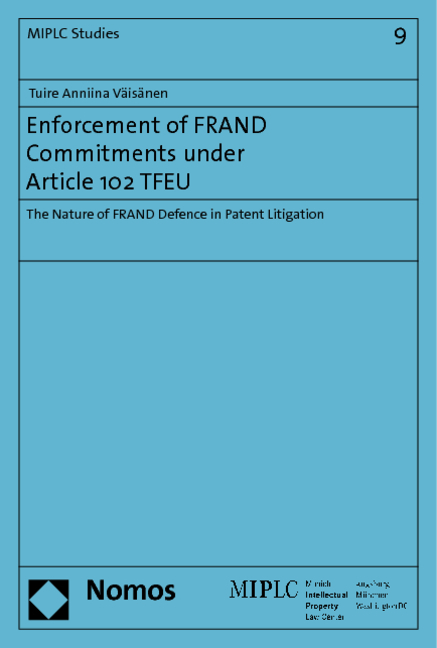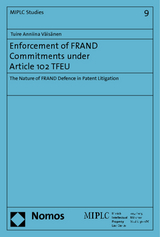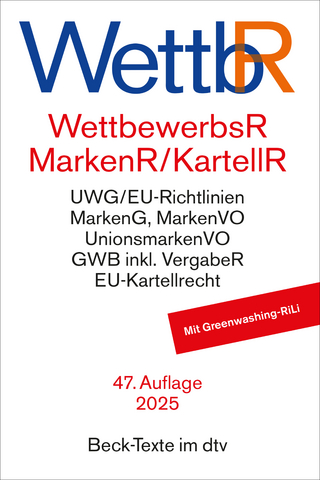Enforcement of FRAND Commitments under Article 102 TFEU
The Nature of FRAND Defence in Patent Litigation
Seiten
Defining the true meaning of the acronym FRAND reminds of the parable of two political parties arguing before the elections: who is right and who is wrong, although they both know that there is no such thing as one truth and most utterly it depends on the individual perspective. Given the very substantial legal and business concerns involved within the telecommunication standardization environment, the conflicts what FRAND terms and conditions means seem to be unavoidable.
The analysis shows that the FRAND debate is very controversial and that many questions related to the enforcement of FRAND commitments under EC competition law remain unsolved. In essence, this paper demonstrates that FRAND commitments can be used as a powerful defence in order to prevent dominant patent holders from abusively exploiting their standard-essential patents. However, when determining the impact of FRAND commitments under Article 102 TFEU, it should be kept in mind that the test that complainants need to meet, is not merely a test based on the rational of FRAND commitments under the relevant SSOs rules. In other words, in the absence of dominance, even if a patentee in fact does not fulfil his FRAND commitments and asks for exorbitant royalty rates, this does not automatically provide complainants with an antirust remedy under the EC competition law.
Currently the author is an associate lawyer with law firm Amereller Rechtsanwälte & Legal Consultants in Munich and Dubai, with the main area of practise IP law and international arbitration.
Die Autorin beschäftigt sich umfassend mit der FRAND-Erklärung des Patentinhabers. Mit Blick auf Artikel 102 AEUV erläutert sie auch den unionsrechtlichen Kontext des Wettbewerbsrechts.
The analysis shows that the FRAND debate is very controversial and that many questions related to the enforcement of FRAND commitments under EC competition law remain unsolved. In essence, this paper demonstrates that FRAND commitments can be used as a powerful defence in order to prevent dominant patent holders from abusively exploiting their standard-essential patents. However, when determining the impact of FRAND commitments under Article 102 TFEU, it should be kept in mind that the test that complainants need to meet, is not merely a test based on the rational of FRAND commitments under the relevant SSOs rules. In other words, in the absence of dominance, even if a patentee in fact does not fulfil his FRAND commitments and asks for exorbitant royalty rates, this does not automatically provide complainants with an antirust remedy under the EC competition law.
Currently the author is an associate lawyer with law firm Amereller Rechtsanwälte & Legal Consultants in Munich and Dubai, with the main area of practise IP law and international arbitration.
Die Autorin beschäftigt sich umfassend mit der FRAND-Erklärung des Patentinhabers. Mit Blick auf Artikel 102 AEUV erläutert sie auch den unionsrechtlichen Kontext des Wettbewerbsrechts.
| Erscheint lt. Verlag | 22.3.2011 |
|---|---|
| Reihe/Serie | Munich Intellectual Property Law Center – MIPLC ; 9 |
| Sprache | englisch |
| Maße | 153 x 227 mm |
| Gewicht | 167 g |
| Themenwelt | Recht / Steuern ► Wirtschaftsrecht ► Urheberrecht |
| Schlagworte | Europäisches Patentrecht • Gewerblicher Rechtsschutz • Markenrecht • Urheberrecht / Gewerblicher Rechtsschutz und Medie • Urheberrecht / Gewerblicher Rechtsschutz und Medienrecht |
| ISBN-10 | 3-8329-5837-1 / 3832958371 |
| ISBN-13 | 978-3-8329-5837-4 / 9783832958374 |
| Zustand | Neuware |
| Haben Sie eine Frage zum Produkt? |
Mehr entdecken
aus dem Bereich
aus dem Bereich
Gesetz gegen den unlauteren Wettbewerb, Preisangabenverordnung, …
Buch | Softcover (2024)
dtv Verlagsgesellschaft
CHF 23,65
Textausgabe zum deutschen, europäischen und internationalen Patent-, …
Buch | Softcover (2023)
dtv Verlagsgesellschaft
CHF 24,95




